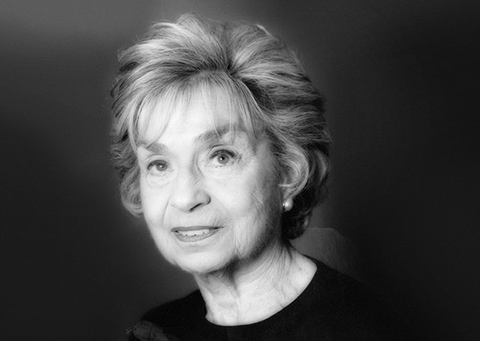“I will miss her.” This sentiment, more than any other, is what members of the U of T community expressed to me following the death of Rose Wolfe last December at age 100.
That, and understandably high praise for her contributions to the university. She served on Governing Council in the 1970s and as U of T’s chancellor from 1991 to 1997, graduating 60,000 students on her watch – including one who was terminally ill and whose degree Wolfe presented in the hospital. She also endowed the Rose and Ray Wolfe Chair in Holocaust Studies and set up scholarships, including one for indigenous students.
But those four little words – “I will miss her” – invariably came up in interviews with people who crossed her path, testifying to her ability to transform what might have been merely a cordial professional relationship into something more.
Born the third of five children to Romanian immigrants who owned and lived behind a small bakery in Kensington Market, Wolfe earned a BA in sociology in 1938 and a social work diploma in 1939, both from U of T. “My parents sold bread for five cents a loaf,” she once told U of T News. “We never knew how they managed to put us through university.”
The next year, she married Ray Wolfe, a young man she called the neighborhood’s “most eligible bachelor;” he became a produce wholesaler, and his work ethic was as strong as hers. One of her first jobs had her placing Jewish children who had survived the Holocaust in Canadian homes. They were, she recalled, “undersized, pale and withdrawn” and they inspired her to commit to a life of service, pouring her always considerable energy into a variety of hands-on and leadership positions in charitable, arts and education organizations.
“When I was dean of social work, Rose would politely tell me where she thought we could do things better,” says Cheryl Regehr, now U of T’s provost. “You appreciated it, this elegant, forceful woman paying attention. I will miss her.”
Prof. Donald Ainslie, principal of University College, says: “She helped me understand the particular role that University College, with its non-denominational history, has played for Jewish students. The students always loved her Hanukkah parties. They felt she was on their side. I’ll miss spending time with her – her wit, her perspective.”
Prof. Anna Shternshis, the director of the Anne Tanenbaum Centre for Jewish Studies, also says she valued Wolfe’s feedback on the centre’s work and her willingness to show up for events. “Rose advocated for integrity, for female leadership in academia, for Yiddish. We made plans to see each other in early January. I do not want to think of a year without Rose Wolfe in it.”
Wolfe’s husband, Ray, predeceased her in 1990. She is survived by her son Jonathan, daughter Elizabeth and four grandchildren. Several of the children she placed in Canadian homes in the 1940s attended her funeral.







No Responses to “ Rose Wolfe Committed to a Life of Service ”
It concerns me that woman are often named with their husband's name when writing about their childhood or early education.
For example, the writer says "Wolfe earned a BA in sociology". Later it says she married after that. So, Rose [birth name] earned a BA; "Wolfe" did not.
Gwenne Becker
BComm 1955